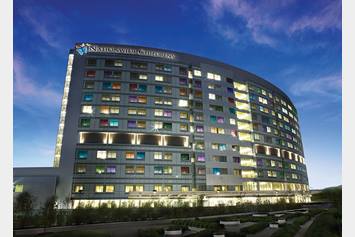Pulmonary Arterial Hypertension
Pulmonary arterial hypertension (PAH) causes high blood pressure in the arteries that carry blood from the heart to the lungs (pulmonary arteries). This makes it harder for the heart to pump blood through the lungs, which can lead to heart failure.
What Is Pulmonary Arterial Hypertension?
Pulmonary arterial hypertension (PAH) is when blood pressure in the pulmonary arteries is high. The pulmonary arteries carry blood from the right side of the heart to the lungs, so they have oxygen.
Pulmonary hypertension happens when the pulmonary arteries become stiff, tight, or narrowed. Over time, scar tissue forms. The narrowing makes it hard for blood to flow through the arteries, causing PAH. This puts strain on the heart, making it large and weak.
Over time, the heart may not keep up with the body’s needs. This is called heart failure.
Signs and Symptoms
Older children, teens, and adults may have 1 or more of these symptoms:
- Tired
- Chest pain
- Dizzy, faints
- Short of breath
- Swollen ankles or legs
- Enlarged nail beds
- Trouble walking up stairs
- Blue colored lips or nail beds
Types of PAH
- Idiopathic PAH - No cause can be found.
- Heritable PAH - Passed down from a parent (inherited).
- PAH with types of heart disease that you are born with - Examples include: repaired and unrepaired atrial septal, and ventricle septal defects (VSD) and patent ductus arteriosus (PDA) that is still open.
- PAH connected with other conditions - Examples include: connective tissue diseases and portal hypertension.
- Drug- and toxin-induced PAH - Certain drugs or poisons (toxins) have been linked to PAH. Examples include: some weight loss drugs and toxic rapeseed oil.
Tests
You may need to have the following tests done to diagnose PAH:
- Chest X-ray – used to see if the pulmonary arteries are large.
- Blood work – rules out other conditions.
- Electrocardiogram (EKG) – checks for heart rhythm changes and heart damage.
- Pulmonary function test – looks for other lung diseases.
- Sleep study – looks for oxygen levels and sleep problems (sleep apnea).
- Echocardiogram (Echo) – checks for increased pressure in the lungs and blood flow in the heart. It looks at the size and strength of the heart.
- Lung scan (V/Q scan) – looks for blood clots and how much blood and air is going to each lung.
- Right heart catheterization – procedure to measure pressures in heart. This is the best way to diagnose PAH.
Treatment
There is no cure for most forms of PAH. However, there are medicines that may help you:
- Phosphodiesterase Inhibitors (PDE-5) – these are medicines taken by mouth or through a feeding tube.
- PDE-5 relaxes blood vessels. This reduces pressure in the lungs.
- Examples of medicines that help the body to relax blood vessels in the lungs are: Sildenafil (Revatio®) and Tadalafil (Adcirca®).
- Endothelin receptor antagonists (ERAs) – these are medicines taken by mouth or though a feeding tube.
- Too much endothelin will cause blood vessels to get narrow and tight. This can lead to high blood pressure in the lungs.
- Examples of medicines that lessen the endothelin in the body: Tracleer®, Opsumit®, Letaris®.
- Prostacyclins – these medicines are breathed in (inhaled), put into the body through a tube (catheter), taken by mouth or through a feeding tube.
- These helps keep all blood vessels open so blood can flow easily. Too little of this in your body may increase blood pressure in the lungs.
- Examples of medicines that help make more prostacyclins in your body: Tyvaso® (inhaled), Uptravi® (by mouth), Ventavis® (inhaled), and Orenitram® (by mouth)
- Oxygen – helps relax blood vessels in the lungs so you can breathe easier.
- Blood thinners (anticoagulants) – these may be used to lower the chance of blood clots in the lungs.
- Water pills (diuretics) – these are used to decrease swelling in the belly, legs, or feet.
Daily Living
With treatment, you can go to school or work and have an active life. You must:
- Go to your cardiologist at least 1 time each year.
- Know the signs and symptoms of PAH and when you feel different than usual.
- Tell your doctor or health care provider if your symptoms get worse.
- Take your medicines as prescribed each day.
- Check with your cardiologist before: exercising, surgery, taking OTC decongestant, having dental work, or getting on an airplane.
- Get plenty of rest.
- Keep up on all vaccines and get your flu shot each year.
- Get a pneumonia vaccine every 5 years.
- Eat a heart-healthy diet that includes chicken, fish, fruit, whole grains, and vegetables.
- Limit the amount of salt (sodium) you eat. It can increase swelling. Buy items that say low sodium. Avoid Fast food.
When to Call the Doctor
Call your cardiologist for any of the following: irregular heart rate, fast heart beat, fainting, poor appetite, or chest pain.
When to Call 911
Call 911 for emergency help if you:
- Are coughing up blood.
- Have a seizure.
- Have trouble breathing, like can't catch your breath, gasping, wheezing, or grunting.
Helping Hands™ Patient Education Materials
Helping Hands™ are easy-to-read guides about different illnesses, therapies, surgeries, and more. They’re created by the Patient Education team at Nationwide Children’s Hospital and are reviewed and approved by clinical staff, like nurses, doctors, pharmacists, and psychologists. Nationwide Children's Hospital is not responsible for misuse of information in patient education materials, including Helping Hands™.
HH-I-239 | ©2004, revised 2024, Nationwide Children’s Hospital



